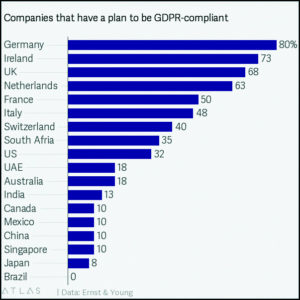GDPR is a regulation that requires businesses to protect the personal data and privacy of EU citizens for transactions that occur within EU member states. And non-compliance could cost the companies dearly.
When EU made the hue and cry, that’s when many people around the world realised the importance of the law. Until then, many companies in the name of collecting and storing data were passing it to their network/associations for their business connect and reach.
When the dire need to implement the law was done on 25th May 2018. It set to force, sweeping changes in everything from technology to advertising, and medicine to banking. The big companies began to tremble and were put on focus. Major issues were pointed on Facebook, Aadhar, Google, Apple and the likes. The law is enforced in EU, but as most of the companies have a global presence they are impacted too.
Now the people are given options to view their security information, which all apps take their personal data and also we can have a check on what’s put in to use.
India’s Vision of Data Empowerment
While many countries (like the EU) focus on making data safer, India is trying to empower individuals with their data database –their ability to easily and quickly access, manage, and move that data. Their vision is to bring significant consumer benefits.
For example, extracting records of commercial transactions in a suitable format and sharing them with a lender can help individuals secure loans; porting data from universities to prospective employers can make applying for jobs more efficient; and a consumer may more easily adopt different technology platforms (e.g., a music service, a social network, a mobile operating system) if she can easily port data to those platforms from platforms she already uses.
Indian IT giants like Infosys, Tata Consultancy Services (TCS), and Mindtree, which service European clients, will see an outsized impact of the new regulations, smaller Indian firms aren’t immune. Be it e-commerce sites with users logging in from, say, Belgium, or an India-based e-payments gateway accessed by someone in Abroad, all companies—tech and otherwise—will need to tweak their terms and conditions to reflect the new rules.
“Digital marketing will be most affected once GDPR comes into effect, as promotional e-mails sent without the recipient’s prior consent will call for a heavy price.
Not just India but many countries in the world are working hard to get the things on track.
And as India looks at drafting its own privacy rules this year we hope new rules benefit the society and the country. It’s the individual’s responsibility to not let go of more personal information and be aware of the consequences. Jadeite being a year old company keeps in check with the latest laws and regulations and adheres to the compliance.



